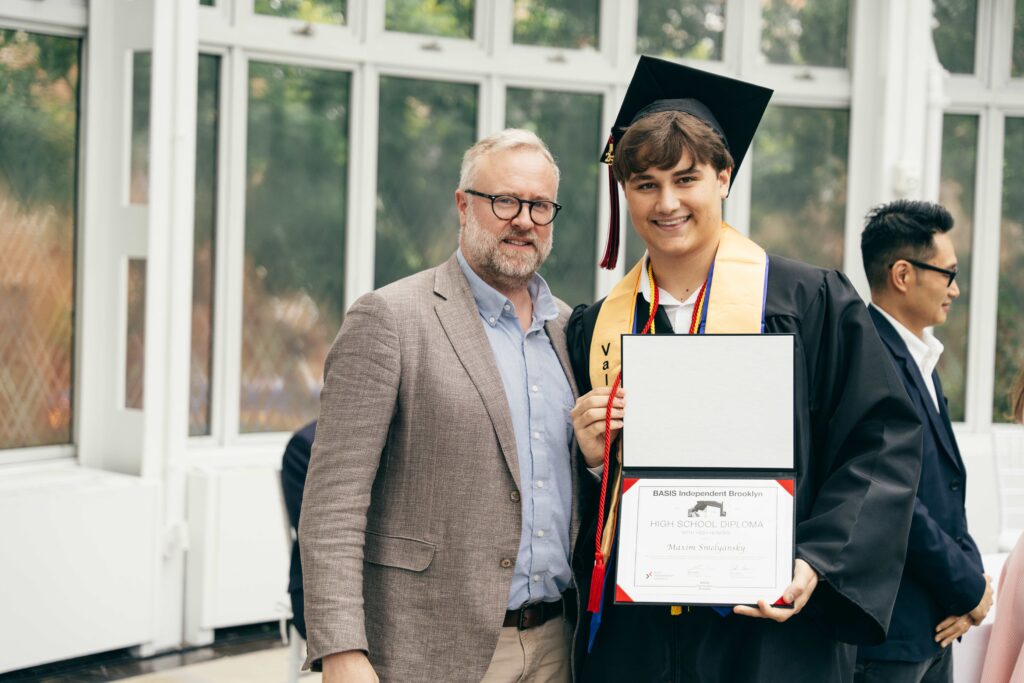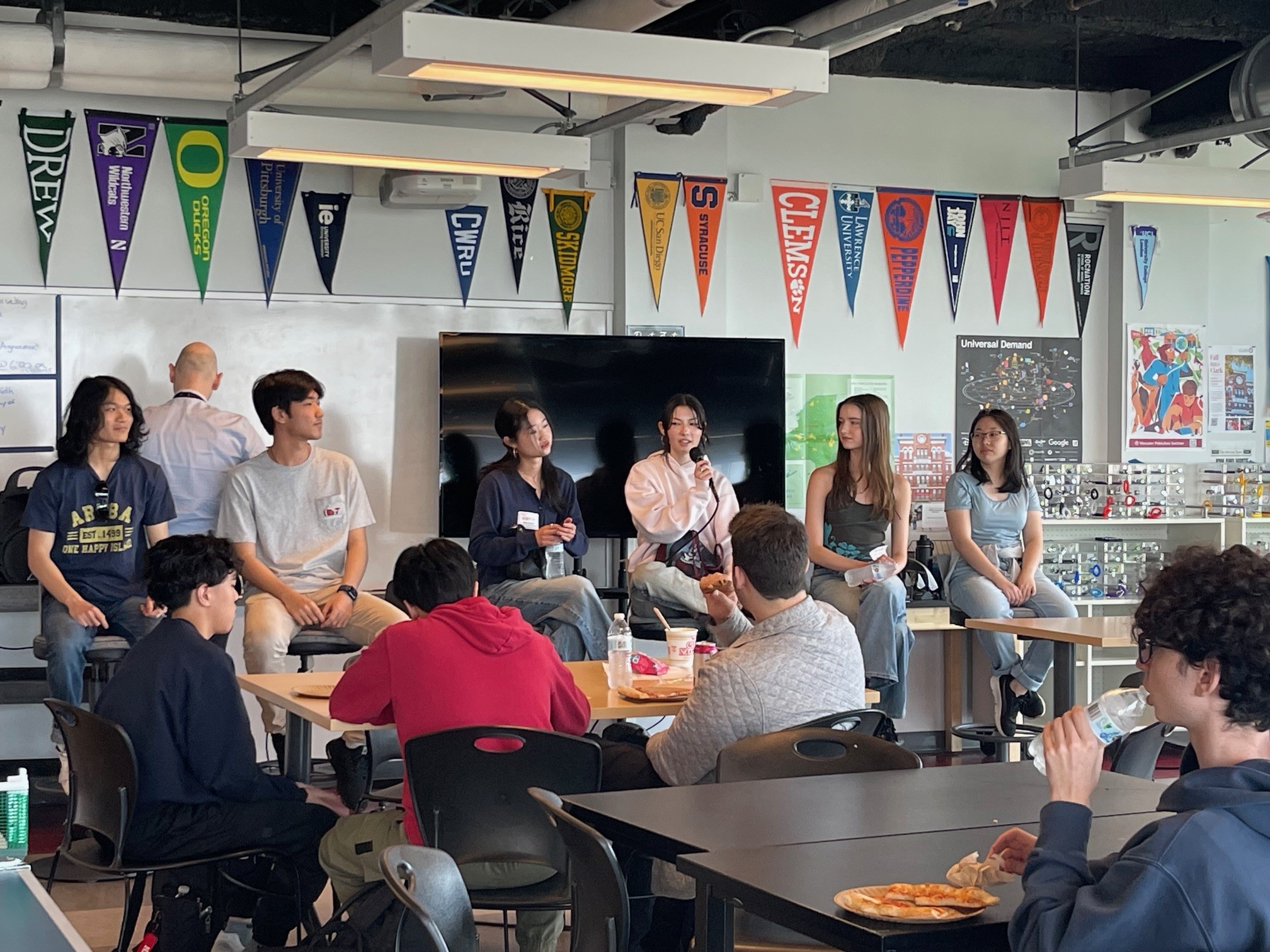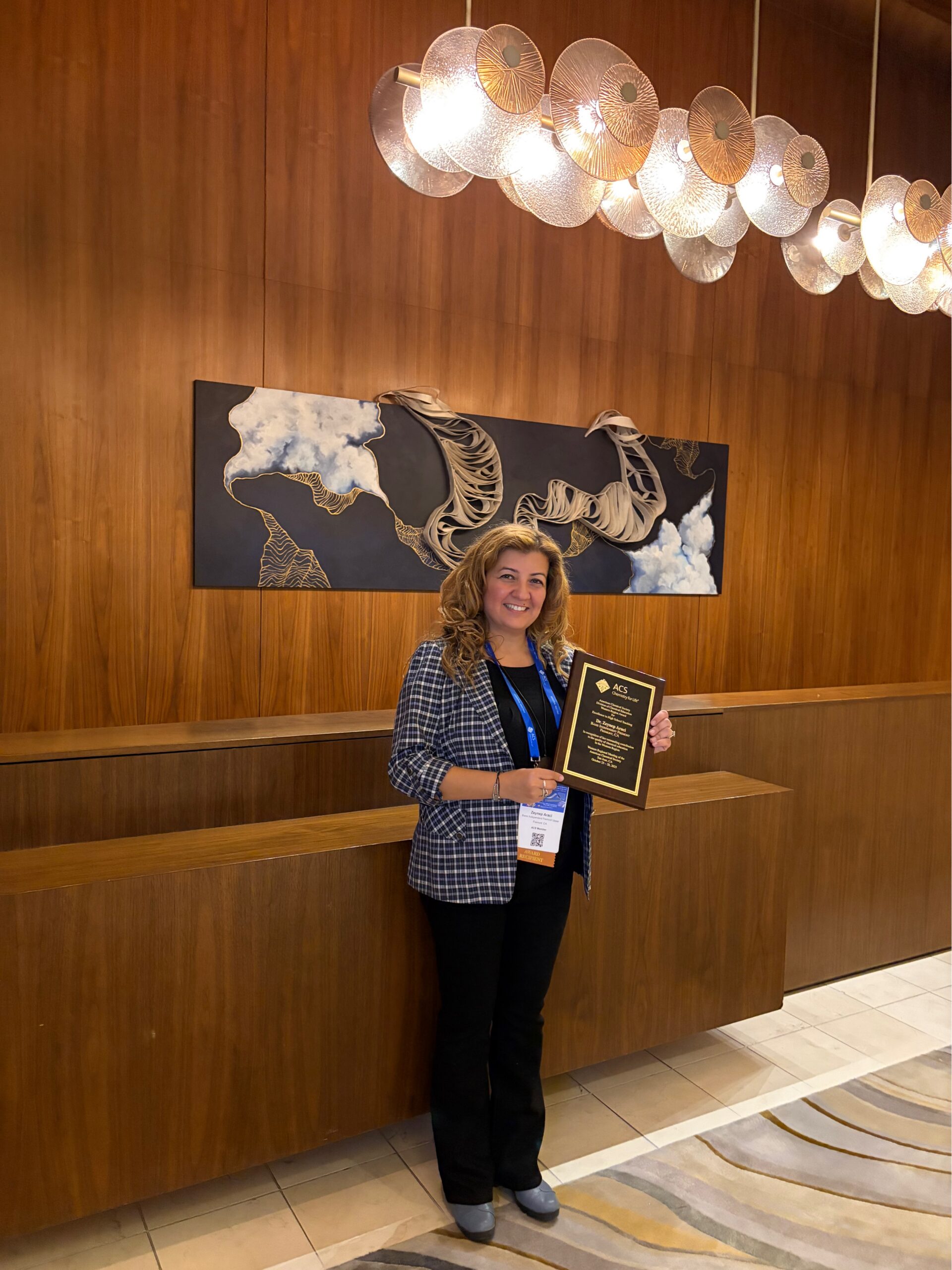November 5, 2025

To kick off a new year of Senior Projects, we are sharing a conversation with the inspiring winner of the 2025 Fellows Scholarship, a $10,000 prize awarded annually to one project. Maxim Smelyansky, a Class of 2025 graduate of BASIS Independent Brooklyn, their 2025 Valedictorian, and current Stanford University student, impressed our committee with his project titled The Future of American High-Speed Rail: Analyzing and Discovering the Most Effective High-Speed Rail Development Methods on Promising Rail Corridors in the United States.
The Senior Project is an independent, student-led culmination of our high school experience. After three years of academic preparation, our seniors are ready to spend the last trimester of their high school careers applying the skills and knowledge they have gained to develop a project that is insightful, academically rigorous, and professional in nature.
Our seniors start by designing a research question that is often centered on a subject they are passionate about or curious about. Then they embark on a journey to answer it, documenting and analyzing their findings as they go. They partner with both an internal and external advisor to support and guide their research. Students may choose to conduct their research in the form of internships or experimental research at university research labs, field work abroad, or research conducted remotely from home. From explorations into new-age technology to cutting-edge medical advancements to social justice, the Senior Project offers students the opportunity to channel their innate curiosity. This experience readies them for the type of self-direction and self-discipline expected in an undergraduate and graduate setting.

In his Senior Project and accompanying blog, Maxim channeled his lifelong passion for transportation into a compelling case for high-speed rail in the United States. Supported by an externship with Ukrainian Railways, his work demonstrates both rigorous scholarship and a bold vision for a more connected, sustainable future. His blog not only makes the case for high-speed rail—it models the kind of intellectual curiosity, clarity, and purpose we aim to foster in all BASIS Curriculum Schools students.
In this interview, conducted over the summer, Maxim shares insights into his research process, the real-world impact of his on-site placement, and the academic foundation that helped him bring his ambitious ideas to life. We hope you’ll join us in celebrating the inspiring work of one of our network’s newest alumni.
Could you give our readers a short introduction to yourself, where you’re from, and what your plan is for after graduation?
My name is Maxim Smelyansky. I am from the BASIS Independent Brooklyn Campus. I am one of the founding family members from 10 years ago. I was originally born in Eastern Europe, but in grade 2 I joined BASIS Independent Brooklyn, and then since then, I’ve grown with the school. And after graduating, I will be studying Civil Engineering at Stanford University in California.
Congratulations on being this year’s Fellow Scholarship recipient. What did this award mean to you?
I worked very hard on this project, working with Ukrainian Railways, conducting my own scholarly literature review. I felt like winning this award was definitely a culmination of my BASIS Independent Schools experience because a lot of the work that I put in was applying the skills that I learned from before, or, for example, from my AP Capstone journey.
Being the Fellows Scholarship recipient really validated my passion for transportation and my dedication to exploring opportunities for more sustainability and America’s future not being so car-dependent, but rather full of walkable cities.
Could you introduce your project and its importance to our readers?
My Senior Project was on the future of high-speed rail in America. Some examples include current projects such as the notorious California High-speed Rail, and semi-high-speed rail, such as Brightline in Florida and Brightline West in Las Vegas, currently in construction. There’s definitely a keen interest in building high-speed rail across America, but there are clear structural and management failures that are visible and could deter America from moving in the more sustainable direction, the direction that would give consumers the freedom to choose which mode of transport they want to use.
So, my research focused on international high-speed rail development methods, usually in countries where the networks are already well developed on a large scale. My criteria, which I shared in my first senior blog post, were countries with over 1,000 kilometers of high-speed rail built and more than 500 kilometers currently in construction. I analyzed existing methods and determined which one would be the best for the application in the United States. I ultimately applied it through a mock Texas high-speed rail project.
It’s an important topic because, most simply, it saves people money. Why in Europe can you buy flights for $10/$15? Because there are good rail connections that are very competitive. So even if you’re not taking the train, you’re still saving yourself money because airlines will have to adjust by having so many more options on the table.
The second thing is that for a more sustainable future, high-speed rail is critically needed. If you look at carbon dioxide emissions on a per-kilometer basis, the thing that emits the most is not a cruise ship, it’s not a car, it is short term domestic flights—think 200 to maybe 500 miles. So your New York to DC flight, your Dallas to Houston, Houston, San Antonio, Austin, all those kinds of flights, those are the ones that emit the most per kilometer flown. And if you want to limit emissions, those are the routes you want to target because there is a simple, more sustainable solution to it.
By caring about high-speed rail, you’re promoting a more sustainable future that also on top of all that, not only makes your flight cheaper—and some of the times makes your commute shorter—but it also creates jobs. It induces development. There’s a reason why most new developments are around where public transit is being built. While that value isn’t seen, the land value that rises around these stations revitalizes their neighborhoods too.
It really is important to care about this because if done right, the amount of benefits from sociopolitical, from an economic, from an environmental point of view, are just simply immeasurable and they can really help bring America into the future. And I also didn’t even mention the crumbling infrastructure that we have right now, the freeways and everything. We need alternatives. We need to diversify our reliance on cars. High-speed rail is a great solution to this.

When did you arrive at the idea for your Senior Project? Were there other ideas that you were considering alongside it, or were you pretty set on this idea from the beginning?
I definitely knew I wanted to continue researching something in the field of transportation. I considered doing something along the lines of continuing my AP Research project, where I studied price discrimination on airline tickets and airline ticketing algorithms.
But I really wanted to do something that allowed me to build upon my internship from last summer at Ukrainian Railways. Thanks to my work there last summer, I was able to get another externship and gain the experience and the knowledge I really needed to help this more ambitious project come to life.
Could you shed some light on how you worked with this group?
I have always been passionate about transportation. And really, after AP Seminar and AP Research, I had some tangible projects under my belt. I’m of Ukrainian origin, so I wanted to use my transportation knowledge to help the betterment of Ukraine and Ukrainian civilians.
My dad actually works in Ukraine, and to visit us, since there are no commercial flights flying in and out of Ukraine, he has to take the train to the border from Kyiv to Warsaw, which is where the largest and closest international airport is.
So, I reached out to Ukrainian Railways, wanting to help research some proposals on how to improve the rail commute between Kyiv and Warsaw. After reaching out and saying I was willing to work for free as an unpaid intern, I was tasked with researching and proposing a potential solution to improve this commute.
The big issue is that Ukraine and former Soviet states have a track gauge or track width wider than their European counterparts. Because of that, the train simply couldn’t go into Poland because Poland had a narrower track width.
And because of that, they had to change trains at a border town called Chelm. Now, the issue with that is for consumers who want to go directly to the airport and not to Warsaw. They would have to first transfer from the train they just took from Ukraine into this border town, change to another train going to the center of Warsaw, and then change to another train going to the airport.
So after analyzing, the flights that could be available if you make a more direct link, I proposed a bus shuttle that picks up passengers from Chelm and goes directly to the airport. And this allows consumers to save precious hours, and allows them to catch most night flights.
So instead of arriving at the airport at maybe 9:00/9:30, they arrived at 7:00/7:30, which allowed them to catch pretty much all the night flights. And that proposal would’ve allowed approximately 22,000 people annually to have a more convenient and daily access to the airport.
That proposal was approved for implementation. While I obviously wasn’t able to help implement it, as this was already getting into the college application season, it definitely made a profound impression on me, showing me that my research actually had a potential tangible impact.
Can you tell me a little bit about your on-site advisor whom you worked with at Ukrainian Railways?
So, he was different from my mentor when I did the internship over the summer. This advisor is the Director of Strategy and Transformation at Ukrainian Railways. And, really, having him as a mentor was definitely very crucial to my success in this project because, simply put, he had a lot of experience, not just domestically, but internationally.
He is looking into high-speed rail developments across the world, as he is envisioning a post-war future for Ukraine.
But at the same time, how can we transform Ukraine in the future, and how can we improve Ukrainian railway services right now? Just having those two facets of experience from a more macro point of view and from a more micro point of view really allowed me to consider a lot of factors.
And even when it comes to something like station locations, if you see in my paper, that just the consideration of those factors on a more micro scale definitely was because of the help I got from my advisor.
He was able to point me in the right direction, especially at the start, looking at what were best practices were. And in a way, obviously, while I was comparing the results of the development methods. He was also able to point me to resources to see what the general best practices are. In that aspect, I was able to learn a lot, especially from the International Union of Railways handbook on high-speed rail development.

What was the most challenging aspect, and how did you face that challenge?
That would be when Russian hackers hacked the Ukrainian Railways Website. This was the week our school came back from Spring Break, and for about two weeks, I did not have contact or support from my on-site mentor because he had to focus on rebuilding the digital infrastructure for Ukrainian Railways to run on time and run smoothly. Doing the project by myself for those two weeks was definitely a bit of a struggle because I couldn’t ask my mentor to point me in the right direction to really figure out what the right sources were
He was an invaluable resource from the beginning. When I first shared my scope, he suggested I review three sources, and those three sources were frankly the backbone of my future research because he knew exactly what I was looking for—he knew the field that well from his decades of industry experience.
Losing contact with him, even temporarily—at the time I didn’t know how long it would be—that definitely was a little bit of a struggle, finding the sources I needed to continue my research. But I would say that my resiliency and my skills, again, from AP seminar and AP research of how to find scholarly sources, how do how to utilize EPSCO or Econ Biz, or Google Scholar, thanks to that, I was still able to find critical sources.
One of them was actually the Transit Cost Project, which was a database that analyzed, I think, 10 or 12 countries. Not all their projects, but all the projects that they were able to find analyzed their high-speed rail development methods on a cost per kilometer basis, which was one of my rubric points. The amount of time they spent per mile of high-speed rail trackage, and also, the percent of the trackage that went through tunnels or bridges, which is more expensive than just on flat land.
Just finding those sources without the guidance of my mentor was a bit of a struggle. Other students probably had much bigger challenges in their Senior Projects than mine, but I’m still proud I overcame that, and my project continued pretty smoothly to the end.
Reading your blog each week, it was clear that your voice as a researcher and author was extremely distinct, and your format was very methodical. You also did a great job making this subject accessible and engaging. Did that come naturally?
When it comes to this topic, it definitely came a little more naturally to me. Even if I wasn’t researching it, I’ve been watching videos on infrastructure construction projects probably since grade 2, maybe even grade 1. I used to play around with subway maps and envision expanding the New York City subway.
But I definitely realized that just because it comes to me naturally, it doesn’t come naturally to everyone else. When I started doing my research, especially when I was explaining the method and rationale for selecting each of the categories and why I gave a country a certain rubric score, I realized that without sufficient context, without reading the previous week’s blog post, you couldn’t just jump in and understand what was going on.
I really needed to figure out how I could convey my message in a way that people could understand; it was one of my main priorities for the blog. True mastery of a subject means that you can explain it in simple terms, and I try to push myself to be in a position where I can explain it in simpler terms and make people understand very quickly.
It helped that the Senior Project allowed me to experiment with visuals and graphics. I found that the only way I was able to explain it very well was through visuals; I even put some in my paper for people to understand and make it as accessible as possible.
One of the important lessons I learned in the blog was making a short abstract giving the reader the basic information, as well as the context, and a summary of the process: okay, this is what he did the week before, and this is how he builds upon it.
Keeping a focused narrative not only kept the readers on track but kept me on track. For example, saying, “This is what I’m going to do next week,” – really setting out my goals for the coming week – kept me accountable and prevented me from falling behind. It also kept me somewhat in check because having an online externship rather than a mentor just keeping an eye on me, it can be a bit difficult to keep yourself motivated. Setting out those goals and putting them out in the public definitely helped me achieve them.

As far as developing your voice as a writer and a researcher, were there any classes you took at BASIS Independent Brooklyn that you want to give a shout-out to?
AP Seminar and AP Research are definitely some of the most useful classes I’ve taken in my high school career, and to be honest, I probably would recommend them to anyone more interested in STEM courses than the humanities courses. I would say that while AP English Language & Composition and AP English Literature & Composition were definitely good classes that helped me find my voice as a writer, the skills that you learn from AP Seminar and AP Research really develop your academic voice, which is crucial for more non-humanities courses and even some humanities in terms of analysis.
AP Seminar helps so much in terms of just broadening your perspectives and evaluating multiple perspectives, which is so important because most of academia isn’t black and white; it’s a lot of gray. It also helped cut through political polarization at times, just by understanding people’s perspectives.
AP Research really helps as well. It’s almost like doing the Senior Project before the Senior Project. You create your own research project, you learn how to develop a proper research question, you develop a method on how to conduct this research and how to even scope your project, you analyze your data, you write a paper, and you present on it. Even if it’s potentially not peer-reviewed journal material, it’s a really good introduction to conducting primary research.
That entire track really made my process much easier in the whole senior year. In Capstones, I was able to focus on the knowledge that I was learning in each class rather than focusing on how to properly write an academic paper with formatting, citations, and everything.
With the base knowledge you get in Seminar and Research, you’re saving yourself time when you’re writing college applications too. Looking ahead, applying these skills can help you in your college classes or even help you land that first position or that internship.
You concluded your BASIS Independent Brooklyn career as both the Valedictorian and the winner of the Fellows Scholarship. That’s a big senior year. As far as the year ahead, do you have any specific academic goals or goals regarding campus involvement?
My big goal for the year would be getting that next internship. With regard to campus involvement, I didn’t necessarily want to give myself concrete plans just yet because I feel like college is a time for learning and exploring. I want to come in the first quarter at Stanford with an open mind.
One idea I definitely have in mind is joining the Transportation Research Center at the Transportation Research Institute at Stanford in some sort of role. But I feel like one of the things that has allowed me to be successful so far is that I had an open mind, and honestly, at times it was because I did things spontaneously. I want to let that flow happen in that first quarter. But I’m definitely going to hold myself accountable. And really, the two big things are getting an internship for next summer and establishing a consistent routine.
Do you anticipate continuing your Senior Project in any form?
In terms of just the field of transportation research in general, yes. That’s definitely something I do want to continue at Stanford. To be honest, transportation has been my bread and butter since the age of three. Maybe even two. I’m proud to say it’s my passion.
What shape or form will it take at Stanford? I’m not exactly sure. Will I definitely try my best to look for those opportunities? Definitely. Either transportation research on campus or finding some potential internships. I would love to do something like transportation consultancy or something like that where I can learn best practices just by being surrounded by experts and professionals.
And I feel like one of the small regrets I have for my Senior Project was that it wasn’t in person. Because I felt like gaining that hands-on experience would’ve definitely helped a lot. But that is something that I would really like to search for at Stanford.
Do you have any advice for students who are looking ahead to their Senior Project?
I think the biggest piece of advice would be to do something you’re actually passionate about. Don’t do something that you find is probably the path of least resistance.
At times during my project, I was questioning myself a lot. If I hadn’t chosen a project I was so passionate about, I probably would’ve given in to the temptations of senioritis.
The second point of advice I would say in general is obviously I lucked out in terms of my placement or externship, but start thinking ahead regarding on-site placements. Without connections, it will require a lot of outreach—a lot of cold calls and cold emails. That takes a lot of time, so start early. Those are the two things that I would really suggest for the Senior Project.
Thank you so much for taking the time to sit down with me to share a little bit more about your senior project. Congratulations again on your many accomplishments and best of luck in the year ahead!
Thank you for giving me the platform. Thank you so much for allowing me to speak proudly of my work and my accomplishments.

Maxim with BASIS Independent Brooklyn Head of School, Mr. Josh Harmon



